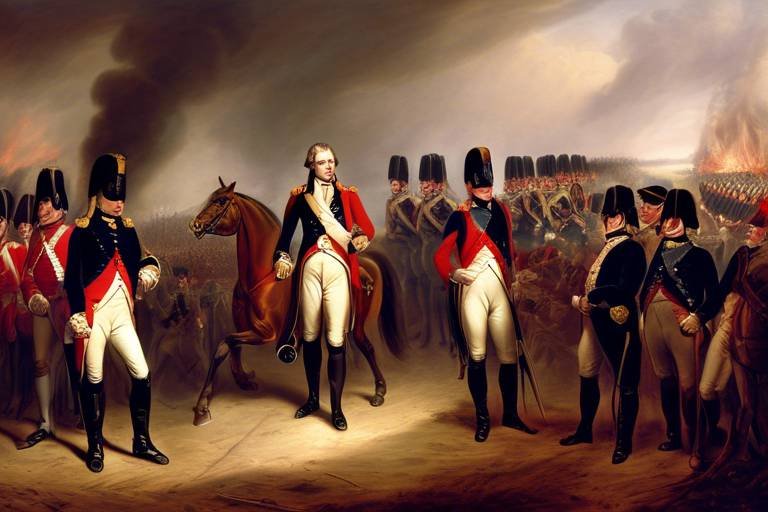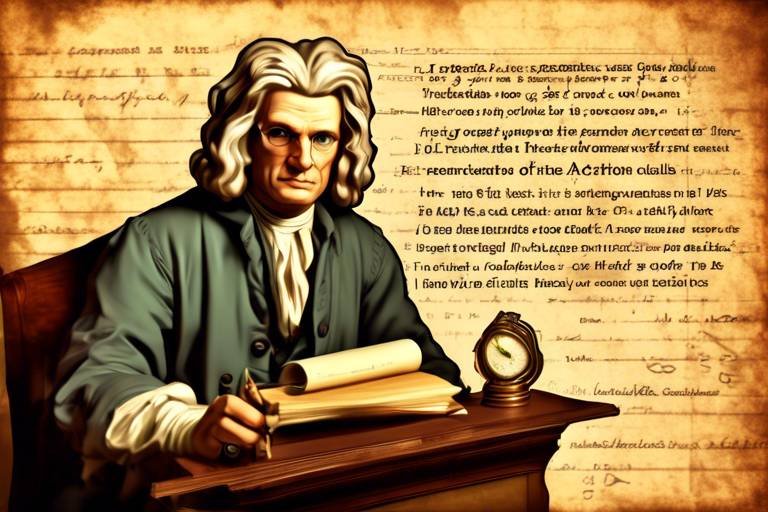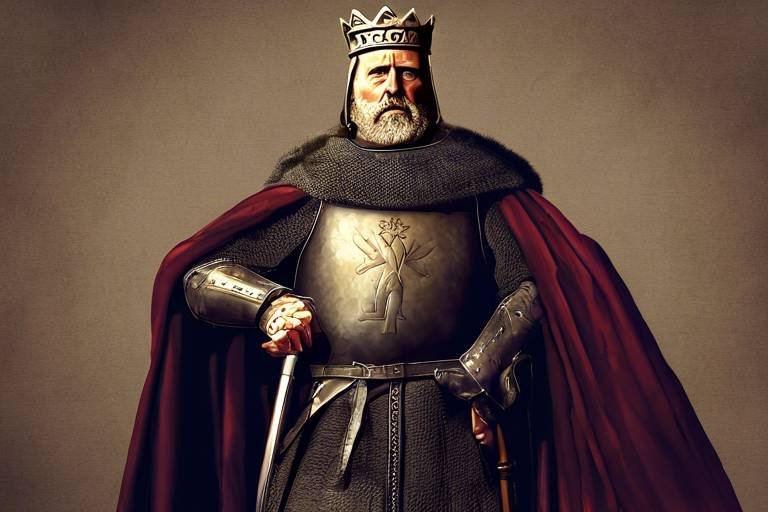King Louis XIV: The Sun King
King Louis XIV, also known as the Sun King, was a prominent figure in French history renowned for his absolute monarchy and opulent court at Versailles. His reign left a lasting impact on French society, culture, and politics, shaping the course of European history. Let's delve into the life, reign, and legacy of this influential monarch.

Early Life and Ascension to the Throne
King Louis XIV, famously known as the Sun King, had a remarkable journey that began with his early life and eventual ascension to the French throne. Born on September 5, 1638, in Saint-Germain-en-Laye, Louis XIV was the son of King Louis XIII and Anne of Austria. His childhood was marked by the influence of Cardinal Mazarin, who served as regent during Louis XIV's youth following his father's death when he was just four years old.
At the age of five, Louis XIV officially became the King of France upon his father's passing in 1643. However, due to his young age, the country was governed by Cardinal Mazarin until Louis XIV reached maturity. It was during this period of regency that the young king's character and beliefs were shaped, laying the foundation for his future reign.
As Louis XIV came of age and assumed full control of the throne in 1661, he embarked on a mission to consolidate his power and establish himself as an absolute monarch. His early years as king were marked by a desire to assert his authority and centralize control over the French government, setting the stage for the grandeur and opulence that would define his reign.
One of the key influences on Louis XIV's reign was his determination to break free from the limitations imposed by the nobility and assert his dominance over the aristocracy. This drive for absolute power would shape his policies and decisions throughout his rule, leading to significant changes in the structure of French society and governance.
Louis XIV's ascension to the throne marked the beginning of a transformative era in French history, characterized by his ambition to strengthen the monarchy and establish France as a dominant power in Europe. His early life experiences and the influences of his upbringing played a crucial role in shaping his reign and setting the stage for the grandeur and authority that would come to define his legacy as the Sun King.

Wars and Military Campaigns
During his reign, King Louis XIV of France was heavily involved in various wars and military campaigns that shaped European history. One of the most significant conflicts was the War of the Spanish Succession, which erupted over the disputed succession to the Spanish throne. Louis XIV's ambitions for territorial expansion and his desire to secure the Spanish crown for his grandson led to a prolonged and costly war that involved major European powers.
Under Louis XIV's leadership, France engaged in numerous military campaigns to expand its influence and control over neighboring territories. The king's aggressive foreign policy and military campaigns aimed to establish France as the dominant power in Europe. Louis XIV's armies, led by skilled generals such as the renowned Marshal Turenne, achieved notable victories but also faced significant challenges and setbacks on the battlefield.
One of the key military strategies employed by Louis XIV was the extensive use of siege warfare to capture enemy fortresses and strongholds. The king's military engineers developed innovative siege tactics and techniques to overcome fortified defenses, allowing French forces to conquer strategic territories and expand the boundaries of the French kingdom.
Louis XIV's military campaigns were not only focused on territorial expansion but also aimed at consolidating his power and influence over vassal states and territories within the French realm. The king's aggressive military policies and campaigns contributed to the centralization of power and the strengthening of the French monarchy, establishing Louis XIV as an absolute ruler with unrivaled authority.
Despite the military successes achieved under his reign, Louis XIV's ambitious military campaigns and costly wars significantly strained the French economy and resources. The prolonged conflicts drained the royal treasury and burdened the French population with heavy taxes and levies to finance the war efforts. The financial strain caused by the wars would have long-term consequences for the French economy and the stability of the realm.
In conclusion, Louis XIV's wars and military campaigns were instrumental in shaping the geopolitical landscape of Europe and establishing France as a dominant power during the 17th century. The king's aggressive military policies, innovative tactics, and strategic vision left a lasting impact on French military history and set the stage for future conflicts and power struggles in Europe.

Patronage of the Arts and Culture
During his reign, King Louis XIV was a fervent supporter of the arts and culture, leaving a lasting impact on the cultural landscape of France. His patronage extended to various forms of art, literature, and architecture, with a particular focus on promoting French artistic achievements.
One of the most notable aspects of Louis XIV's patronage was the transformation of the Palace of Versailles into a magnificent center of artistic excellence. The palace not only served as the royal residence but also as a showcase of French artistry and craftsmanship. The opulent decorations, grandiose architecture, and lavish gardens of Versailles reflected the king's dedication to promoting the arts.
Moreover, Louis XIV played a pivotal role in the development of French literature and theater. He established the French Academy to regulate and promote French language and literature, setting standards for literary excellence. The king's support for playwrights and actors led to the flourishing of French drama, with renowned playwrights like Molière enjoying royal patronage.
Under Louis XIV's patronage, French culture experienced a golden age, with artists, writers, and musicians thriving in the vibrant atmosphere of the royal court. The king's passion for the arts not only enriched the cultural heritage of France but also elevated the country's status as a center of artistic innovation in Europe.

Religious Policies and Persecution
During his reign, King Louis XIV implemented various religious policies that significantly impacted the religious landscape of France. One of the most controversial decisions was the revocation of the Edict of Nantes in 1685, which had granted religious freedom to the Protestant Huguenots. This act led to the widespread persecution of Huguenots, forcing many to either convert to Catholicism or flee the country to escape religious persecution.
Louis XIV's religious policies aimed to establish Catholicism as the dominant religion in France and to centralize religious authority under the Catholic Church. The king believed that religious unity was essential for maintaining political stability and strengthening his absolute monarchy. As a result, he actively promoted Catholicism and suppressed Protestantism through various means, including the closure of Protestant churches and the prohibition of Huguenot religious practices.
The persecution of Huguenots under Louis XIV's reign had far-reaching consequences, leading to the exodus of a significant number of skilled artisans, merchants, and professionals from France. This mass emigration not only weakened the French economy but also deprived the country of valuable contributors to its cultural and intellectual life. The revocation of the Edict of Nantes and the subsequent religious persecution left a lasting scar on the religious tolerance and diversity of France.
Despite the harsh religious policies implemented by Louis XIV, it is essential to acknowledge that they were a product of the political and religious context of the time. The king's actions were shaped by the prevailing belief in the divine right of monarchs and the close relationship between religion and state power. While his religious policies may be viewed as oppressive by modern standards, they must be understood within the historical context of the era of absolutism in Europe.

Legacy and Historical Impact
King Louis XIV, also known as the Sun King, left a profound legacy and historical impact on French society, politics, and culture that reverberated far beyond his reign. His rule marked a pivotal period in French history, characterized by the centralization of power and the development of absolutism in Europe.
One of Louis XIV's most enduring legacies was his grandiose court at Versailles, which served as a symbol of his absolute monarchy and power. The opulence and magnificence of Versailles reflected Louis XIV's belief in the divine right of kings and his desire to project an image of authority and splendor.
Furthermore, Louis XIV's patronage of the arts and culture played a significant role in shaping the cultural landscape of France. His support for French literature, theater, and the arts helped elevate France as a cultural powerhouse in Europe, with influences that can still be seen today.
However, Louis XIV's reign was not without controversy, particularly regarding his religious policies. The revocation of the Edict of Nantes in 1685 led to the persecution of Protestant Huguenots, resulting in religious intolerance and the suppression of religious freedom in France.
In terms of military endeavors, Louis XIV's ambitious wars and territorial expansion efforts left a complex legacy. While he achieved military success in some campaigns, such as the War of Devolution and the War of the Spanish Succession, the prolonged conflicts also strained the French economy and fueled resentment among neighboring powers.
Despite these challenges, Louis XIV's reign left an indelible mark on French history, setting the stage for future developments in politics, culture, and society. His legacy as the Sun King endures as a symbol of power, authority, and the complexities of monarchy in early modern Europe.

Marriages and Family Life
Marriages and family life played a significant role in shaping the personal relationships and political decisions of King Louis XIV. Known for his elaborate court and romantic entanglements, Louis XIV married Maria Theresa of Spain in 1660 to strengthen political alliances. Despite this arranged marriage, Louis XIV engaged in numerous extramarital affairs, most notably with his mistress, Madame de Montespan. These relationships not only influenced his personal life but also had implications for court politics and power dynamics.
Furthermore, Louis XIV's family life was marked by tragedies and complexities. He fathered several children with both his wife and mistresses, leading to questions of legitimacy and succession. The deaths of his son and grandson before him created a succession crisis that ultimately resulted in his great-grandson, Louis XV, inheriting the throne. This dynastic struggle and the intricacies of royal marriages highlighted the challenges of maintaining power and stability within the monarchy.

Economic Policies and Financial Management
King Louis XIV's economic policies and financial management played a crucial role in shaping the economic landscape of France during his lengthy reign. Known for his ambitious building projects, extravagant court life, and military campaigns, Louis XIV faced significant challenges in managing the finances of the kingdom.
One of the key aspects of Louis XIV's economic policies was his reliance on taxation to fund his endeavors. The king implemented various taxes, such as the taille (land tax) and the gabelle (salt tax), to generate revenue for the state. These taxes, although necessary for funding the king's projects, often burdened the common people and fueled discontent among the population.
In addition to taxation, Louis XIV also engaged in mercantilist policies aimed at promoting domestic industry and trade. He established state-controlled manufacturing industries, granted subsidies to artisans and merchants, and imposed tariffs on foreign goods to protect French industries. These policies, while beneficial for the domestic economy, also faced criticism for their restrictive nature.
Furthermore, Louis XIV's costly military campaigns, such as the War of the Spanish Succession, strained the kingdom's finances and led to mounting debt. The king's pursuit of territorial expansion and military glory came at a high cost, contributing to economic instability and financial challenges for France.
To manage the financial affairs of the kingdom, Louis XIV relied on skilled finance ministers, such as Jean-Baptiste Colbert, who implemented reforms to streamline tax collection, improve accounting practices, and reduce corruption. Colbert's efforts to modernize the financial administration of France helped stabilize the economy to some extent, although the overall financial situation remained precarious.
In conclusion, Louis XIV's economic policies and financial management reflected the complexities of governing a powerful but financially strained kingdom. While his investments in infrastructure, arts, and military prowess left a lasting impact on French society, the economic consequences of his reign also underscored the challenges of sustaining grandeur and power without jeopardizing the stability of the state.

Death and Succession
Upon the death of King Louis XIV on September 1, 1715, after a reign of over 72 years, France faced a significant transition period. Known as the longest-reigning monarch in European history, Louis XIV's death marked the end of an era characterized by his absolute monarchy and grandeur at Versailles. The succession crisis that followed his passing led to the rise of his great-grandson, Louis XV, who ascended to the throne at the age of five.
The passing of Louis XIV brought about a shift in power dynamics within the French court and raised questions about the future direction of the country. With Louis XV being a minor at the time of his accession, a regency was established to govern in his place. This regency, led by Philippe II, Duke of Orléans, faced challenges in maintaining stability and continuity in the absence of a strong monarch.
As Louis XV grew older and assumed full control of the throne, he inherited a kingdom facing internal strife and external threats. The new king's reign would be marked by ongoing conflicts, including the War of the Austrian Succession and the Seven Years' War, which would test France's military capabilities and diplomatic alliances.
Despite the challenges faced during the transition from Louis XIV to Louis XV, the latter's reign would see developments in art, culture, and philosophy that would shape the Enlightenment era in France. The legacy of the Sun King lived on through his great-grandson, albeit in a changing world where the ideals of absolutism were being challenged and redefined.
Frequently Asked Questions
- Who was King Louis XIV?
King Louis XIV, also known as the Sun King, was the monarch of France from 1643 until his death in 1715. He is renowned for his absolute monarchy, opulent court at Versailles, and significant impact on French history and culture.
- What were some key aspects of Louis XIV's reign?
During his reign, Louis XIV led numerous wars and military campaigns, supported the arts and culture, implemented strict religious policies, centralized power, and managed the economy of France.
- How did Louis XIV influence French culture?
Louis XIV's patronage of the arts and culture, exemplified by the grandeur of Versailles, played a crucial role in shaping the cultural landscape of France. He promoted French literature, theater, and architecture, leaving a lasting impact on the country's artistic heritage.
- What was the significance of Louis XIV's religious policies?
Louis XIV's religious policies, including the revocation of the Edict of Nantes and the persecution of Huguenots, had a profound impact on religious freedom in France. These actions aimed to strengthen Catholicism and centralize power under the monarchy.
- How did Louis XIV's reign come to an end?
After ruling for over 72 years, Louis XIV passed away in 1715, leading to a succession crisis. His great-grandson, Louis XV, ascended to the throne, marking the conclusion of the Sun King's lengthy and influential reign.



















